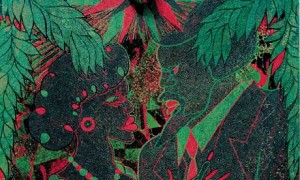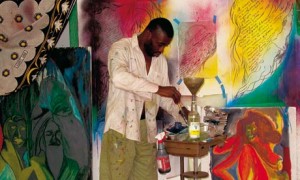Morning, in Colorado, if I'm not teaching or trying to make a school lunch my offspring will actually eat, involves a second cup of Double Bergamot Earl Grey tea and a quick skim of The Guardian, online, with the memory of pretending to read it, a broadsheet, upside down in bed, with my dad. The paper, not me. I was two.
Thus, a few days ago, I paused, mid-sip, to read this: "Now he's ditching the dung and the glitter, and going some place darker." And see this:

Then read this, which repeats the words but the words are a "connected complex," so I won't kill them down:
" -bit by bit – [he] jettisons the things that made him famous:the dung, the glitter, the multi-coloured, pasted-on genitalia and afro heads. Get up close to his earlier paintings – the surfaces encourage it, catching the light and writhing with life – and you lose yourself in the visual riffs, the art-nouveauish riots of plant life, the chains of dots and blobs, the beats and pulses and beads of colour. It's like listening to multi-layered music on headphones, and being delayed by all the detail."
And put my cup down.

Adrian Searle, in other words, on Chris Ofili's new show :
"[It's] a lesson in learning to be free. Not of the shadows cast by other artists, but of his own.....[S]ome artists grow scared of their shadows; they get so stuck with the thing they have become known for that they are paralysed, unable to find a way forward. Ofili, instead, has raced ahead. On Sunday he told me that he is letting his new work lead him where it will."
How do you let go of the "dung and glitter" of your early work, whether that's a "body" of work, like Ofili's, or the first "finished" draft of a manuscript? When forming a sequence, a narrative, a long poem, how do you "ditch" what makes/made it palatable, in some sense -- beautiful?/'writhing with life"? -- and go, instead, for the dirty book? The book that exceeds its contents: that is more than you? That takes you "where it will"? That darkens, opposing lyric decisions and opportunities.
I began to consider a speck of glitter, a fleck of dirt. How the "imperceptible" element, brought forward, becomes the site of species intensity; what brings it forward? The insect in the sodden pasture, carrying a bit of mud on its back, its black and yellow wing, etc. Shedding minerals as it flies, or is eaten. Here I would quote Agamben if getting up from this desk to get the book didn't make the floor creak and thus wake my son, in these tentative ten or fifteen minutes before he falls into a truly deep sleep.
Substitute Activity #173: Leaning in a doorway on Monday, at Naropa, I encountered the poet Amy Catanzano as she was leaving to teach a class. Amy recently wrote an essay with Christian Bok and the Butthole Surfers in it, to give you an example of the kind of animal we are dealing with. When I asked her about the dung and glitter, she said this. She said it, and I asked her to write it down, which she did, then sent it to me, in this altered and intensified form:
"Bhanu, the password to the quantum supercomputerpoem will be NCC-1701
My forms, like their protagonists, are all rocketship these days. Yet I would rather consider progress as mutation rather than evolution, which is more inviting of non-linear time where the pre and the post accelerate into what Alfred Jarry calls The Imaginary Present, a second, symmetrical present that redefines duration as the “becoming of memory.”
In proposals such as string theory, time is a cubist face of space, a spacetime comprising a multiverse that interacts with forces such as quantum gravity, which I picture as the invisible background swell in a Chagall painting upon which objects are psychedelically unhitched…
Like a hand on the anywhere, in slight repose. Or, more threadbare: “Beware of all enterprises that require new clothes” (oh, Thoreau!).
Seems the pre can include pre-science and also prescience—getting rid of the monolithic hyphen here—a more promising framework for the writing process and progress. Prescience, if plucked from containment within Aristotelian time, provokes alternate universes (which are questions?) of instinct, exchanges between imperceptibility and transparency. That is not to say I’m not all Scientific Method too, wanting to invent new tech for the poem, for you.
Which brings us to the latest reboot of Star Trek. Enterprise engineer Scotty, upon discovering how his future-self develops the Federation’s first Trans-Warp technology—which permits the transportation of people on/off starships traveling at warp speed—remarks, As One Might in a Poem, “It never occurred to me to think of space as the thing that was moving.” I feel this analogy is a good example of the glitter. Now, THE DUNG:
Like a deity this is, and most applauded. I predict a thorough vetting. I predict the top of a poem. I predict preparedness everyone. I predict prestigious prestigious—Like a deity make a power! Like a Titan fake a wake! Like that other face, in alpha-hide, only yours to make
LUCKILY, GLITTER IS INNUMERABLE
As innumerable as the more benevolent tender buttons in my heart. Shall “I become a transparent eye-ball” (Emerson)? Now that’s a stylistic hyphen. Emerson, again, just past the occasion of glittering—where form makes time: “Words are the finite organs of the infinite mind.”
And so now I am asking you. What do you do with what is "pre" in your writing? How do you make an abiogenetic decision? How do you let go of the motifs, styles and obsessions that have brought you this far? For example, how do I let the "red" soak back into the garden? I let the rosebush die. I build a fire from the stalks and petals, on the ice. Well, I don't. I notice that it is almost impossible to destroy a living, or near-living, rose.
Bhanu Kapil was born in the United Kingdom and lives in the United States and the United Kingdom. She...
Read Full Biography

